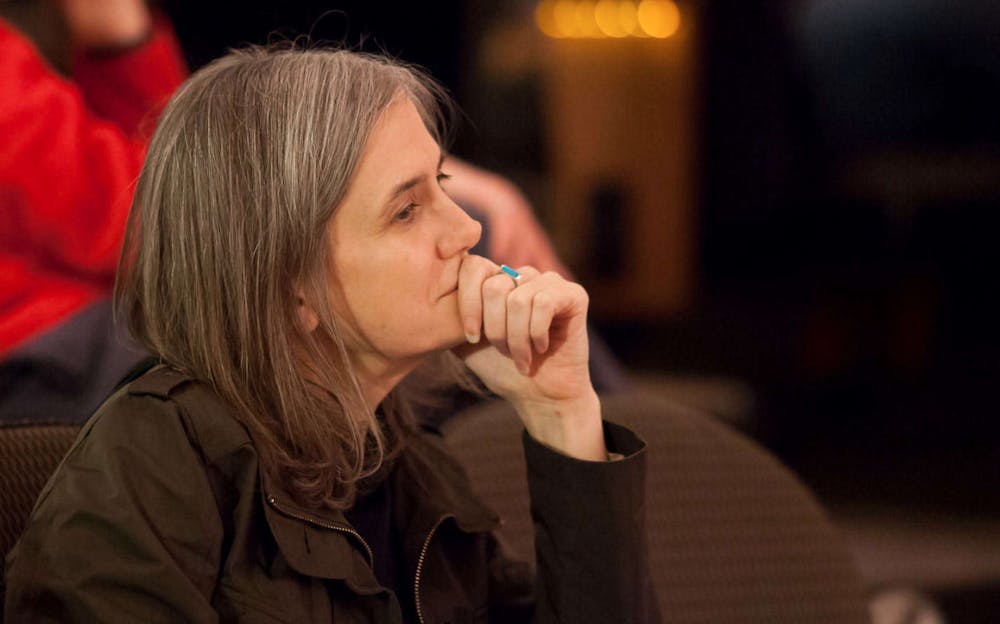The Foreign Affairs Symposium (FAS) hosted Amy Goodman on March 4 to discuss her ongoing work as an investigative journalist and host of Democracy Now!, an independent news program focused on social activism, critiquing corporate influence and analyzing American foreign policy.
Goodman was the second speaker in “Where Do We Go From Here?”, the symposium’s 2021 speaker series. The event was moderated by FAS Co-Directors Ryan Ebrahimy and Margaret Hanson.
Goodman is the recipient of various awards, including the Robert F. Kennedy Prize for International Reporting, the George Polk Award and the Gandhi Peace Award, and is the author of six books. She has received praise for her coverage of the East Timor independence movement in Indonesia in 1991 and the Dakota Access Pipeline protests in 2016.
At the event, Goodman described the humble beginnings of Democracy Now! and how the network came to expand to its current size.
“We were formed in 1996 as the only daily public election show in public broadcasting. We were on nine community radio stations. We were going to last for nine months,” she said. “But the day after the election, stations were saying there’s more interest now in Democracy Now! than there has ever been.”
Goodman also talked about the current state of the program and how its coverage is now focused on popular movements.
“We’re an independent television and radio show and an independent international news hour. [We] believe in the power of people speaking for themselves,” she said. “There is nothing more powerful.”
Celebrating its 25th anniversary this year, Democracy Now! is currently broadcast on 1,529 stations globally and is one of the leading international independent news sources.
During the event, Goodman also discussed the essential role of media in society, explaining why former President Donald Trump had such a contentious relationship with the media during his presidency.
“It is critical we have a democratic media where people can describe their own situations. I see the media as a huge kitchen table that stretches across the globe that we all sit around and debate and discuss the most important issues of the day,” she said. “[Trump] understood the power of people communicating with each other. He came to represent, both metaphorically and literally, a wall.”
Goodman highlighted the significance of the shift in transparency between the Trump and the Biden administrations.
“Now that wall is a door [with the] Biden-Harris administration. I’m not saying the door is open — the door is closed, but it’s not locked,” she said. “The question of whether that door is kicked open or remains shut is up to democratic movements.”
She also stressed the critical role of popular movements in enacting change.
Goodman cited the pandemic as an example of the media’s duty to provide information on subjects corporate media generally avoids.
“The pandemic has exposed the fissures in the system: the inequality, the lack of access to healthcare,” she said. “When was last time one of the corporate networks had a deep discussion of the issue of Medicare for All?”
Goodman also shared her an optimistic outlook for the future, arguing that movements must continue to fight for democracy.
“There is not one person; it’s movements that inspire me. It’s people organizing together,” she said. “You don’t achieve democracy — you fight for it, every day. Each generation has to find what will be fair for that community, and ensuring as many people as possible have a voice.”
In an interview with The News-Letter, senior Becky Shade stated that Goodman’s style of speaking made her messages more meaningful and understandable.
“One thing I thought was strong about Amy as a speaker is that she has a lot of anecdotes [that] make the talk more memorable,” she said. “She emphasized the importance of people representing themselves and speaking for themselves in journalism, and I feel really strongly about that.”
FAS Development Committee Director Daphne Tang expressed her belief to The News-Letter that Goodman’s comments represent how the media ought to portray current events.
“She underscored that the people who support grassroots movements — including those that promote gender, racial and economic equality — are not the silent majority,” she said. “Her perspective that the media should show the reality of what is happening on the ground and provide a free forum where people can speak for themselves deeply resonated with me.”
Chris H. Park, the programming director of FAS, is a News & Features Editor for The News-Letter. He did not contribute reporting, writing or editing to this article.

















